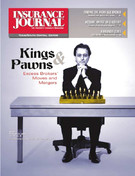When Marshall Leicht was installed as president of the Texas Surplus Lines Association in November 2004 he reminded attendees at TSLA’s annual meeting of the many issues confronting surplus lines agents. Leicht, who is executive vice president and marketing manager of Houston-based Leicht General Agency, took time recently to discuss some of those industry concerns, such as current conditions in the surplus lines market and where the market is headed in 2005.
Insurance Journal: What legislative issues will TSLA be working on during this legislative session?
Marshall Leicht: That will depend entirely on what issues arise during the current session. As of now, the TSLA has no committed legislative agenda other than to continue to monitor proposed legislation and act as an information source for lawmakers with regards to the placement of surplus lines business in Texas, when needed.
IJ: What are the prevailing issues of concern currently faced by surplus lines insurers in Texas and nationally.
ML: As a wholesaler/MGA, I not sure I’m qualified to speak on behalf of insurers and their concerns, however, one would think that the subjects of tort reform, construction defects and maintaining profitability in an ever softening market would be among many of the issues they are concerned with.
IJ: In what way will the current dialogue regarding compensation disclosures affect surplus lines wholesalers?
ML: It is still unclear where that dialogue is leading. The TDI is currently looking at surplus lines placement in Texas. The answer is it’s too early to tell. It is an issue we at the TSLA will continue to pay close attention to.
IJ: How do you see the property/casualty market playing out in 2005?
ML: There is no question that the property market is getting softer with regards to pricing pretty much across the board. Casualty pricing is softening in some areas.I see no reason, nor have I heard anything that would convince me, that this price erosion will not continue through all of 2005.
IJ: How did you get involved in the surplus lines industry and how has it changed since you entered the business?
ML: After four years on the retail side of the industry, I joined a MGA in Houston. That was 17 years ago. I’m not sure which area to list as having undergone the greatest change–communication, technology or market diversification. I can still recall, without much fondness, agents in the middle of the ’86-’87 hard market, having to drive over to see their underwriter, application in hand to plead their cause. I still recall the handwritten four-line quotes shoved into that new fangled fax machine. The manner in which we conduct business today is far more efficient and precise yet at the same time more fraught with peril than ever before.
IJ:What advice would you have for retail agents regarding establishing and maintaining relationships with surplus lines wholesalers?
ML: Performance is the key. Submit completed applications. Respond in a timely manner to questions. Be accountable for the managing of your account. Act like your livelihood depends on your actions. Demand this from yourself and the people in your agency. When you act in this manner you should have every reason to expect your surplus lines wholesaler to respond in kind.
IJ: What advice would you give to people interested in a career in the surplus lines insurance industry?
ML: Same as I would those interested in the retail insurance industry. In the coming years education and training are going to be more critical to the success of both the individual and the organization than ever before. Our industry’s rapidly changing technology is going to require more training of the individual, not less. Our industry’s ever-expanding products and coverage options are going to require more education, not less. The individuals that succeed in our industry in the future will be those willing to acquire the necessary knowledge and skills to compete.
Was this article valuable?
Here are more articles you may enjoy.


 Chubb CEO Greenberg on Personal Insurance Affordability and Data Centers
Chubb CEO Greenberg on Personal Insurance Affordability and Data Centers  Howden-Driven Talent War Has Cost Brown & Brown $23M in Revenue, CEO Says
Howden-Driven Talent War Has Cost Brown & Brown $23M in Revenue, CEO Says  Charges Dropped Against ‘Poster Boy’ Florida Contractor Accused of Insurance Fraud
Charges Dropped Against ‘Poster Boy’ Florida Contractor Accused of Insurance Fraud  What Analysts Are Saying About the 2026 P/C Insurance Market
What Analysts Are Saying About the 2026 P/C Insurance Market 


